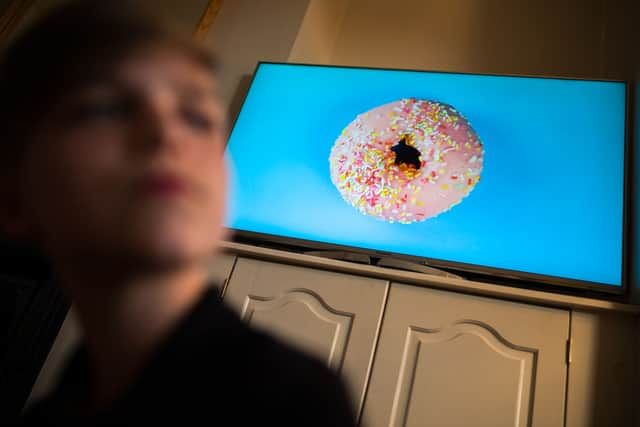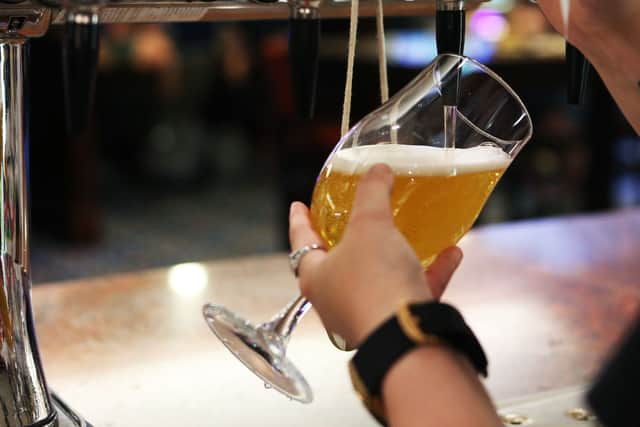Calorie counts on menus: what do experts make of new measure at big pub and restaurant chains in England?
and live on Freeview channel 276
Calorie counts have been added to menus in big pub, fast food, cafe and restaurant chains across England today (Wednesday 6 April).
The new law requires non-prepacked food - i.e. dishes made at the eatery - and soft drinks to have the calories they contain clearly signposted by businesses that have more than 250 employees.
Advertisement
Hide AdAdvertisement
Hide AdBoris Johnson’s Government has introduced the legislation in a bid to tackle a worsening obesity crisis in the UK and push consumers towards making more informed, healthier choices when eating out or ordering takeaways.
But what do food and drink experts make of the new law?
Here’s what you need to know.


What are calorie counts?
A calorie is a unit of measurement for how much energy is contained in food and drink items.
The NHS recommends consuming 2,000 calories a day if you’re a woman and 2,500 if you’re a man - although highly active people can consume more.
If you eat or drink more calories than you burn, the body turns the leftover energy into fat.
Advertisement
Hide AdAdvertisement
Hide AdA calorie count is a numerical indicator of how many calories are contained within a particular dish or drink.


They are already seen on menus at some major food establishments - for example Wetherspoons has included them on its menus since the early 2010s.
Dieters, amateur fitness fanatics and professional athletes often track calories through apps, such as MyFitnessPal.
The thinking is that keeping track of calories helps people to bear in mind how much energy they’re consuming, and could make it easier for the public to remain within the NHS’s recommended limits.
Advertisement
Hide AdAdvertisement
Hide AdThe idea of legislating to put calorie measurements on menus has been floating around for some time, and only became law in July 2021.
What do experts think about new calorie count law?
The Government says calorie counts could play “an important role” in helping to keep the public healthy.
It argues that providing consumers with more information on menus could “help us consume fewer calories when eating out or getting a takeaway”.
But the reaction to its new legislation has received a mixed response.
Alcohol not included in calorie counting legislation
Advertisement
Hide AdAdvertisement
Hide AdThe calorie count legislation has been criticised in some quarters for not including alcoholic drinks.
Alcohol is one of the most calorific things you can consume, weighing in at seven calories per gram - almost as many as a gram of fat, according to the NHS.


“This information should not be hidden from consumers,” said Andrew Misell, director for Wales at charity Alcohol Change UK
“Alcohol is a risk factor for over 200 health conditions and, like obesity, is a major cause of diabetes, stroke, cancer and high blood pressure, so it’s important that we know what’s in our drinks.
Advertisement
Hide AdAdvertisement
Hide Ad“Including calorie information on alcoholic drinks, together with ingredients, unit information, low-risk drinking guidelines and more, would be a positive step forward in supporting us to make healthier choices about our drinking.”
Calorie counts ‘not enough’ to tackle obesity on their own
The British Nutrition Foundation said the move could help support the public “to make healthier choices” but added it would not be enough on its own to tackle the obesity crisis.
“There is some evidence that calorie labelling can encourage people to choose meals with fewer calories and might have a positive effect on overall energy intake,” said Dr Simon Steenson, a nutrition scientist at the British Nutrition Foundation.
“Achieving even a small reduction in the calories we eat every day can help with maintaining a healthy weight. It can also encourage businesses to consider the portion size of foods and drinks that they sell or motivate them to offer healthier meals.
Advertisement
Hide AdAdvertisement
Hide Ad“However, giving customers more information on the calorie content of what they are buying is unlikely to have a large impact on current obesity levels in isolation.”
Dr Steenson said he felt that because eating out is seen as a treat by many people, adding calorie counts to menus might not have the impact on consumer behaviour the Government thinks it will.
He called for the introduction of a “variety” of measures to battle obesity, including ones which encouraged people to choose food and drink items that have low fat, sugar and salt contents.
Calorie counts pose ‘major challenges’ to restaurants
This criticism was echoed in a Twitter thread by leading chef Sven-Hanson Britt, who added that “education is key” from a young age and could help better inform the population about what’s healthy.
Advertisement
Hide AdAdvertisement
Hide AdMr Britt also pointed out some of the difficulties the legislation presented to restaurants.
For example, what the protocol is should they have to temporarily swap in ingredients or how accurate calorie counting measures could be in fine dining establishments where recipes are not always rigidly stuck to.
Eating disorders ‘could be worsened’ by calorie counts
Eating disorder charity Beat has warned calorie counts could make some people’s mental health conditions worse.
“We know from the people we support that including calories on menus can contribute to harmful eating disorder thoughts and behaviours worsening,” said Tom Quinn, director of external affairs at Beat.
Advertisement
Hide AdAdvertisement
Hide Ad“For instance, it can increase a fixation on restricting calories for those with anorexia or bulimia, or increase feelings of guilt for those with binge-eating disorder.
“There is also very limited evidence that the legislation will lead to changed eating habits among the general population.”
If you need support for an eating disorder, please contact Beat via its website.
Comment Guidelines
National World encourages reader discussion on our stories. User feedback, insights and back-and-forth exchanges add a rich layer of context to reporting. Please review our Community Guidelines before commenting.
